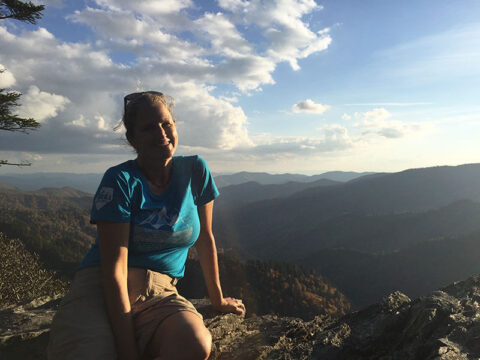A few years ago, my three best friends from college and I were near the end of a 10-hour hike on the Appalachian Trail last October. And almost at the end of our ropes, frankly. We had climbed 1,500 vertical feet in the morning and then spent several hours winding our way along a ridge line with steep drop offs on either side. We were making slow time—so slow that the sun had started to set and we were on the trail at dusk, about a mile from that night’s shelter.
Thankfully, we had a REI Adventure guide with us, but nevertheless you don’t want to be walking in the dark. Tripping over stones and stumps is a greater threat than bears, but still it was an animal encounter that weighed on our minds.
“I’m so happy,” Kim said, her face glowing with fairy-like joy in the firelight. “I don’t know why, but I’m just so happy.”
Right after we turned on our headlights, my friend Barbie began to sing, “We are family; I’ve got all my sisters with me.” We joined in and repeated the chorus over and over until we made it to the shelter. That night, as we ate freeze-dried spaghetti that had been reconstituted with hot water, the four of us giggled like we did when we were sitting around drinking Jack and coke in college. “I’m so happy,” Kim said, her face glowing with fairy-like joy in the firelight. “I don’t know why, but I’m just so happy.”
Read More: A Woman Who Cured Herself of the Blues Over a Month-Long Trek
Nature and Happiness Research: “Outdoorphins” Are a Thing

Jeannie basking in the view at sunset, getting a Smoky Mountain high through REI Adventures.
Her pronouncement made me realize how happy I was too. Like perfect-moment happy. This was our second night out in the Great Smoky Mountains National Park, and, at the time, it seemed like the happiness stemmed from relief and a sense of achievement. But looking back now, I think that after spending so much time in a thick forest, we were all giddy on something that has been called—cutely—”outdoorphins” and “Vitamin G” (for green).
John Denver knew what he was singing about way up in his Rocky Mountains, that nature does give good buzz.
We were, in other words, high on nature—a concept that makes me think of hippies not science. But recently, bonafide research is finding that John Denver knew what he was singing about way up in his Rocky Mountains, that nature does give good buzz. “We have naturally evolved to respond positively to an environment that’s rich in natural resources,” says Judith Heerwagen, an environmental psychologist in Seattle, who believes nature is a basic human need, our true comfort zone.
Green is Stronger Than Blue
With the pandemic making us feel stifled and trapped, getting outside is more important than ever for dealing with the angst of it all. A 2010 study showed that subjects who took long walks through forests over three days showed lower stress hormone levels, pulse rate, and blood pressure; counterparts walking the same amount in cities had no such reduction. Neuroscientists have documented that subjects viewing natural settings have many more interactions of the mu receptors, triggering pleasurable mental reactions. Other studies have found that time among flora and fauna makes you less likely to be depressed, anxious, and angry and more likely to feel energized and generous.
“In nature, we feel more in touch with who we really are and what we want to do,” says Richard Ryan, a professor of psychology at the University of Rochester, explaining his research on the nature-niceness connection.
Inhaling airborne antifungal and antibacterial compounds in nature significantly increases immune function, which has led to a national pastime in Japan called “tree bathing.”
Sure, the sun-dappled woods hold fewer stress triggers than your fluorescent-lit cubicle, but more is at work here. A Japanese research team has zeroed in on airborne antifungal and antibacterial compounds called phytoncides that help plants fight disease. Inhaling these seems to significantly increase immune function, specifically by boosting anti-cancer agents. This has contributed to a national pastime known as “tree-bathing”; millions of Japanese walk along 48 designated Forest Therapy trails every year for relief from what ails them in the country’s notoriously crowded cities. Other researchers have discovered that breathing in a harmless soil microbe—M. vaccae—acts like a natural Zoloft. The microbe apparently stimulates the release of cytokines, which can in turn lead to the production of serotonin in the mood-regulating area of the brain. And don’t forget that the sun beams down vitamin D, a known depression fighter.
A Little Goes a Long Way

Even though they were sleeping in rustic shelters, Barbie and Kim were all smiles on day three on the Appalachian Trail.
Fortunately for urbanites, a little alfresco time goes a long way. One of Ryan’s studies at the University of Rochester found that being in nature for just 20 minutes a day could significantly boost vitality levels. And the University of Essex in the U.K. found that five minutes walking in a green scene reduced depression in 71 percent of participants. Of course, getting to city parks helps, but to make the most of a visit, spend time under trees rather than in open fields for maximum phytoncide intake. And slow down—preferably without being plugged into I-pods or smartphones—so that all five senses can get their share. It’s even OK to run your fingers through soil.
A study in the U.K. found that five minutes walking in a green scene reduced depression in 71 percent of participants.
“The effects are enhanced if you’re paying close attention to nature, immersing yourself,” says Ryan. Even in the city, you can grow phytoncide-emitting houseplants, and, amazingly, you can get a bliss bump from just looking at photos of gorgeous scenery—which may explain why my dentist’s exam room has a waterfall poster on the ceiling. More good news for the building-bound: the tree-bathing research team has found that aromatherapy—such as cypress oil—can also deliver phytoncides.
As much as possible, devise reasons to get outside, such as planting a garden that will need tending. When I had chickens in my Austin backyard, taking care of them morning and evening got me out at the best times of day. My favorite outdoor chore now is hanging clothes on a line I’ve strung between two oaks. It’s not the Appalachian Trail, but the sunshine, the sky, and a breeze always goose my spirits. All that and laundry done. That’s another kind of happiness.
Read More: Aging Well Is the Best Revenge: The Secret Is Your Attitude





















0 Comments